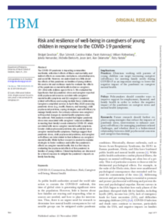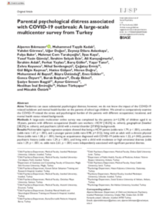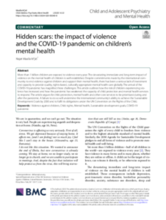This section includes resources and tools for mental health and psychosocial support during the COVID-19 pandemic.
Displaying 11 - 20 of 65
ស្របពេលដែលកើតមានឡើងនូវការឆ្លងរីករាលដាលនៃជំងឺកូវីដ-១៩ក្នុងសហគមន៍ ហើយសាលារៀន ត្រូវបានបិទទ្វារសារជាថ្មីនៅតាមបណ្តារាជធានីខេត្តផ្សេងៗនៅទូទាំងប្រទេសកម្ពុជា កុមារភាគច្រើនត្រូវនៅឃ្លាតឆ្ងាយពីមិត្តភក្តិម្តងទៀត និងមិនអាចរីករាយជាមួយសកម្មភាពដែលពួកគេធ្លាប់មាន។ នេះគឺជាវីដេអូខ្លីមួយដែលអប់រំអំពីគន្លឹះសំខាន់ៗចំនួនប្រាំ ដើម្បីលើកកម្ពស់សុខុមាលភាពផ្លូវចិត្តរបស់កុមារ នៅក្នុងពេលវេលាដ៏លំបាកមួយនេះ! សូមទស្សនា និងចែករំលែកបន្តទៅកាន់អ្នកដែលអ្នកគិតថា ពួកគេកំពុងត្រូវការចំណេះដឹងទាំងនេះ។ សូមរក្សាសុវត្ថិភាពរបស់ខ្លួនឱ្យបានខ្ជាប់ខ្ជួនគ្រប់ពេលវេលា!
This report analyses 1,804 care leaver responses collected in 21 English local authorities between 2017 and 2019.
The authors of this study used a risk and resilience model to evaluate the effects of the pandemic on mental health in diverse caregivers with children ages birth to 5.
The authors of this study conducted a large-scale cross-sectional population study of Hong Kong families with children aged 2–12 years. Parents completed an online survey on family demographics, child psychosocial wellbeing, functioning and lifestyle habits, parent–child interactions, and parental stress during school closures due to COVID-19.
This research aimed to provide a systematic review of the evidence on the COVID-19 pandemic’s impact on youth mental health.
The authors of this study aimed to comparatively examine the COVID-19 related stress and psychological burden of parents with different occupational, locational, and mental health status related backgrounds in Turkey.
This Child Protection learning brief, the second in a series, has been prepared for UNICEF country offices and practitioners as they respond to mental health and psychosocial impact during the pandemic.
The objectives of this study were to describe the mental health status and the change in perceived strain among caregivers of children with special needs in India during the COVID-19 outbreak.
This article focuses on examining the impact of the COVID-19 pandemic and its socio-economic consequences on children in adversity in India, describing the increased child protection and psychosocial risks they are placed at, during and in the immediate aftermath of the COVID-19 crisis and its lockdown situation.
This article outlines how the risk of children experiencing violence has increased and how the pandemic has weakened the capacity of child protection and mental health services to respond.






